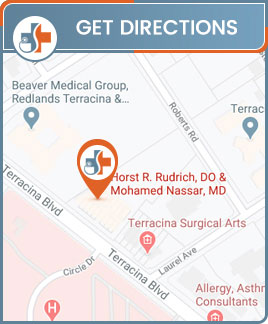Senior Care Clinic in Redlands, CA
The goal of elderly care is to promote autonomy, dignity, and a fulfilling life for seniors, allowing them to age with grace and maintain their independence as much as possible. If you or anyone around you is looking for senior care, please visit Dr. Mohamed Nassar. For more information, contact us or schedule an appointment online. We are conveniently located at 255 Terracina Blvd, Suite 105 Redlands, CA 92373.


Table of Contents:
What are the roles and responsibilities of senior care?
What is the concept of elderly care?
When is Senior Care necessary?
How do you choose the right senior care?
The roles and responsibilities of senior care are diverse and extensive, as they encompass a wide range of tasks and support needed by elderly individuals. One of the primary responsibilities of senior care is to assist with activities of daily living (ADLs), such as bathing, dressing, grooming, toileting, and medication management. Caregivers may also provide support with mobility and transfers, ensuring the safety of seniors when moving around or transferring from a bed to a chair. In addition to physical care, companionship is an important aspect of senior care, as caregivers provide emotional support, engage in meaningful conversations, and participate in social activities with the elderly person.
Senior caregivers may also be responsible for meal planning and preparation, ensuring that the individual receives proper nutrition and a balanced diet. Additionally, they often monitor the individual’s food and fluid intake, administer medications according to prescribed schedules, and keep track of any changes in their health. Home maintenance tasks, such as light housekeeping, laundry, and grocery shopping, may also fall under the scope of senior care responsibilities.
Another crucial role of senior care is to coordinate medical appointments and transportation, ensuring that the elderly person attends all necessary healthcare visits, including doctor appointments, therapies, and diagnostic tests. Caregivers may accompany the individual to these appointments, act as a liaison between the senior and healthcare professionals, and help in understanding and implementing healthcare recommendations or treatment plans.
Furthermore, senior caregivers are often responsible for monitoring the overall health and well-being of the senior. This can involve regularly checking vital signs, recording any changes in physical or cognitive functioning, and communicating these observations to healthcare providers or family members. Caregivers may also keep track of medication schedules and maintain medical records or documentation.
Elderly care refers to the provision of support and assistance to older adults who may have challenges or limitations due to aging, illness, or disability. It includes a huge range of services and activities that focus on the health and quality of life of older individuals. The concept of elderly care recognizes the unique needs and vulnerabilities of the aging population and seeks to meet those needs through physical, emotional, and social support. This can include assistance with daily tasks, healthcare coordination, companionship, and creating a safe and comfortable environment for older adults.
Senior care is necessary when older individuals require assistance with activities of daily living (ADLs) or when they have specific medical or cognitive needs that cannot be met independently. It is often required when older adults experience physical limitations, chronic health conditions, or cognitive decline that affects their ability to live independently and safely. Senior care may be necessary when individuals struggle with tasks such as bathing, dressing, grooming, medication management, or meal preparation. Additionally, senior care may be needed when older adults require monitoring of their health conditions, assistance with medical appointments and treatments, or when they would benefit from companionship and emotional support. The need for senior care can vary from person to person, depending on their unique circumstances and capabilities.
Choosing the right senior care involves considering the specific needs and preferences of the individual, their health and mobility level, the level of care required, budget constraints, and location. Start by assessing the care needs, such as assistance with daily activities or specialized medical care. Research and explore different senior care options, including assisted living facilities, nursing homes, home care agencies, or independent living communities. Visit and tour the facilities, speak with staff, and gather information on the services provided.
Consider the quality of care, safety measures, social activities, and the general atmosphere. Additionally, review pricing structures and determine if the chosen option is affordable. Getting recommendations from doctors, friends, or family who have experience with senior care can also be helpful. Ultimately, choosing the right senior care involves finding a balance between meeting the individual’s specific needs and ensuring their overall comfort, safety, and well-being. For more information, contact us or schedule an appointment online. We are conveniently located at 255 Terracina Blvd, Suite 105 Redlands, CA 92373. We serve patients from Redlands CA, Loma Linda CA, Highland CA, San Bernardino CA, Grand Terrace CA, Yucaipa CA, and Moreno Valley CA.

Additional Services You May Need
▸ Geriatric Medicine Doctors
▸ Diabetes Care
▸ Joint Injections For Arthritis Care
▸ Heart Disease
▸ Primary Care Physician
▸ Telemedicine
▸ Primary Care Doctor
▸ Internal Medicine Doctor





